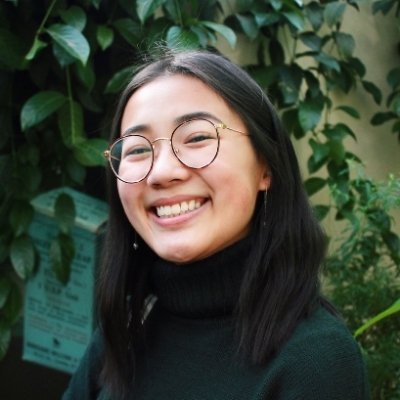We’re delighted to present this essay by Jennifer Cheng, our incredible Literary Outreach/Education Programs intern who joined us this past winter/spring, about an experience at an author visit that impacted her.
Bringing Worlds to Life: Fostering Empathy and Creativity through a Historical Fiction Writing Workshop
As students slowly trickle into the virtual labyrinth that is Microsoft Teams, one 5th grader, backlit by the window behind them, says hello.
“Is this the writing thing? Can I show you my drawing?”
Jabari dances his green monster across the screen and, as he moves the monster around, it’s like the numerous eyes are following me and the monster’s two bulky arms are waving to welcome me.
It is immediately clear that this is a creative and outgoing group of students—perfect for the upcoming task of imagining the life of someone from history in order to tell a powerful story about an unsung American Revolution hero.
I start by asking students to think about a small moment from their own life. Immediately, hands fly up. Students tell stories of mischievous dogs, the time they rode a bike on their own for the first time, and when they got their first tablet.
To tell these stories more effectively, they need to use sensory details: what did they smell? Taste? Touch? Hear? See?
Then, students meet James Armistead Lafayette, a dashing man with bright, youthful eyes wearing a frock coat. James was an enslaved man from Virginia who joined the Continental forces during the American Revolution with the hopes of being freed after his service. During the war, he served as a double agent spy, loyal to the colonies.
“What’s a small moment that James might have experienced? What do you think he felt?” I ask.
Caroline’s chubby cheeks—tinged a slight pink—fill the screen. “I’ve been going nonstop. I was sent off again. Being a spy is tough,” she says.
The students immerse themselves in a world long gone, imagining wet, muddy roads, tightly-held secret notes, and the lingering scent of gunpowder in the air.
Kalyn’s face fills the screen, and she reads confidently from her page. Then, a brief pause. She admits, “I didn’t get to finish writing everything down, but…”
Her round eyes search the air, and her pencil taps against her temple. The yellow polka dots painted onto the wall behind her are like thought bubbles coming out of her head. We listen as she, on the fly, adds to her story and gives new voice and life to a person from history.
The students then examine a painting of the 1st Rhode Island Regiment, a company of soldiers made up by a majority of Black men.
“Why’s there a boy with drums?” Isaiah jumps in to ask.
“I just read a book and it said that they used sound sometimes to talk to each other on the field,” Oscar quickly replies.
“Yeah, the drums could have been used to give out commands, like a code,” I say.
“The drum beat kept the men in sync while marching, too,” the educator adds.
Though it was such a quick exchange, what struck me was the feeling that this was an open community of learners pooling together knowledge.
As I mark my own year of virtual learning, I have grown accustomed to endless virtual meetings marked by a sense of fatigue and reluctance. These young minds, however, are filled with thoughtful questions and an innate sense of empathy with an enslaved man who lived long ago and fought for both the nation’s independence and his own freedom.
Witnessing tomorrow’s leaders imagine themselves in someone else’s shoes reminds me of how powerful, and how rejuvenating, educational and creative spaces can be.
Jennifer Cheng (she/her/hers) is a senior at the George Washington University studying English, film, and journalism. She is passionate about facilitating connections between people based on a shared love of literature and the arts. She began volunteering with PEN/Faulkner in May 2020 as an author ambassador and is currently the editorial assistant of her university’s alumni magazine and president of her chapter of the Alpha Delta Phi Society, a gender-inclusive literary and arts society. An aspiring educator, she hopes to empower her future students to embrace their own voices and to share their stories. Her background as a first-generation college student and child of working-class immigrants has shaped her views of education as a critical space for fostering creativity and of the need for diverse stories in classroom curricula. Currently back in her childhood home in Silver Spring, MD, she recently began bread-baking (she finally bought a kitchen scale!) and also enjoys painting and graphic design.

